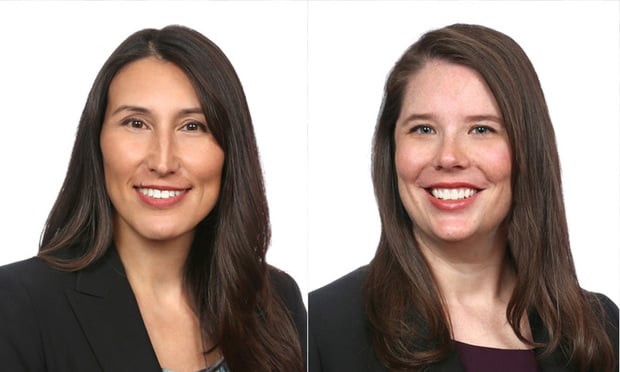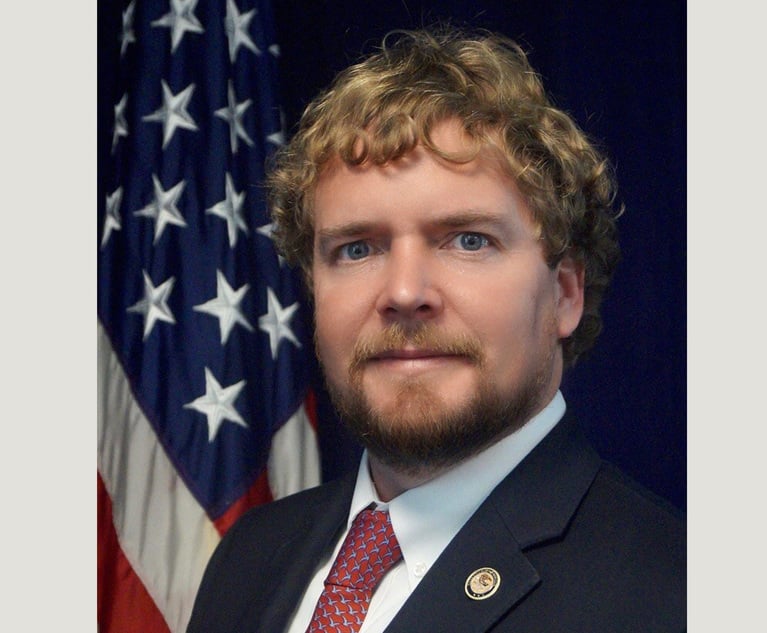Managing Risk During a Quarantine Slowdown
Watch collections; be careful rearranging fees; beware of "dabbling"; and check of CLE requirements.
July 27, 2020 at 12:28 PM
6 minute read
 Shari Klevens (left) and Alanna Clair, Dentons. (Courtesy photos)
Shari Klevens (left) and Alanna Clair, Dentons. (Courtesy photos)
The last several months have been wholly unprecedented, in many different ways. Lawyers have experienced the challenges of working and practicing law from home. The ongoing quarantine and shutdowns also have impacted different types of practices in different ways.
Litigators, for example, have had wildly variant experiences over the past several months. Some have faced court closures, delays or stays in cases, while others have been taking remote depositions and appearing in court by video call. Lawyers who practice in employment or insurance law, for example, may find their practices booming during this time, while lawyers who practice in other areas of the law may find themselves with more time on their hands than in years past.
For lawyers whose practices have been disrupted by the pandemic, an increase in free time can create risks. Below are some tips for managing risks in the face of unexpected free time.
Pay Attention to Collection Efforts
As clients and firms face economic pressures, it is important to stay on top of outstanding client invoices. Managing a law practice involves a financial element of ensuring that lawyers are paid for their work.
Normally, lawyers may use the end of the calendar year to focus on billing and outstanding collections. However, due to the financial realities, many firms are prioritizing collections now, or, at a minimum, checking in with clients regarding their financial needs and any impact current circumstances are having on the lawyer's previous understanding of the fee arrangement. This can help reduce the likelihood of financial pressures or misunderstandings later in the year and can help alleviate the pressure of the year-end rush.
Take Precautions When Considering the Use of AFAs
Some clients, who themselves may be experiencing a disruption, may ask you to change your fee structure or billing arrangement, causing you to consider Alternative Fee Arrangements. For instance, certain clients may request to transition from an hourly fee structure to a flat fee arrangement that will allow the client to budget appropriately. However, when making changes to existing fee arrangements, courts and state bars will look to confirm that any changes made to existing billing arrangements are equitable to the client's interests. While mid-representation fee changes can be common (particularly, for example, with yearly hourly rate fee increases), nonroutine changes can be subject to increased scrutiny.
Georgia Rule of Professional Conduct 1.5 addresses the factors to be considered in determining the reasonableness of a fee. Among the factors to be considered are:
- The time and labor required, the novelty and difficulty of the questions involved, and the skill requisite to perform the legal service properly;
- The fee customarily charged in the locality for similar legal services;
- The amount involved and the results obtained;
- The nature and length of the professional relationship with the client;
- The experience, reputation, and ability of the lawyer performing the services;
- Whether the fee is fixed or contingent;
- The likelihood that the acceptance of the particular employment will preclude other employment by the lawyer; and
- The time limitations imposed by the client or by the circumstances.
Considering the aforementioned factors may help to protect lawyers from accusations of manipulation, particularly if the client or the practice are facing financial pressures that warrant revisiting the original fee arrangement.
Continue Legal Education
During their downtime, lawyers may take the opportunity to develop or continue to maintain their knowledge. For some, this may mean taking the time to learn about new developments in the law or meeting their state's continuing legal education requirements. Others may try to educate themselves in the ways that the pandemic is affecting their clients and their industry on the federal, state, and local levels. By becoming informed in the ever-changing developments, lawyers may be better positioned to support their clients or even reach out to clients to ensure their COVID-specific needs are being met.
There are many online resources that provide CLE programs on a number of topics, both practice-specific and unique to these uncertain times. Some law firms are even hosting their own CLE programs for in-house lawyers or clients or members of the bar. Hosting such resourceful programs can provide an opportunity to educate and demonstrate cutting-edge expertise during this tumultuous time.
Beware When 'Dabbling'
A significant risk of downtime is that lawyers may feel pressure to expand their work into more booming practice areas to make up for other deficits. However, there are risks in "dabbling" in high-risk practice areas that are not within the lawyer's expertise or knowledge. This is not only because lawyers may be more likely to make a mistake when engaging in unfamiliar areas of the law (leading to a claim), but also because there are certain practice areas that receive a higher number of malpractice claims (or a higher value of malpractice claims). Indeed, some insurance policy applications require lawyers and firms to specify the types of law in which they practice before issuing a policy. Dabbling outside of those areas could put coverage at risk.
In addition, the professional rules require lawyers to act with competence in their practice. Georgia Rule of Professional Conduct 1.1 provides, "A lawyer shall provide competent representation to a client. Competent representation as used in this rule means that a lawyer shall not handle a matter which the lawyer knows or should know to be beyond the lawyer's level of competence without associating another lawyer who the original lawyer reasonably believes to be competent to handle the matter in question." As explained in Rule 1.1, competence requires "the legal knowledge, skill, thoroughness and preparation reasonably necessary for the representation." Thus, while it is typically appropriate to associate with a more experienced lawyer when working in a new practice area, there can be risk where a lawyer is doing so without that guidance.
Shari L. Klevens is a partner at Dentons in Atlanta and Washington, D.C., and serves on the firm's U.S. board of directors. She represents and advises lawyers and insurers on complex claims and is co-chairwoman of Dentons' global insurance sector team.
Alanna Clair, also a partner at the firm in Washington, focuses on professional liability and insurance defense. Klevens and Clair are co-authors of "The Lawyer's Handbook: Ethics Compliance and Claim Avoidance" and the 2020 edition of "Georgia Legal Malpractice Law."
This content has been archived. It is available through our partners, LexisNexis® and Bloomberg Law.
To view this content, please continue to their sites.
Not a Lexis Subscriber?
Subscribe Now
Not a Bloomberg Law Subscriber?
Subscribe Now
NOT FOR REPRINT
© 2025 ALM Global, LLC, All Rights Reserved. Request academic re-use from www.copyright.com. All other uses, submit a request to [email protected]. For more information visit Asset & Logo Licensing.
You Might Like
View All


Law Firms Mentioned
Trending Stories
Who Got The Work
J. Brugh Lower of Gibbons has entered an appearance for industrial equipment supplier Devco Corporation in a pending trademark infringement lawsuit. The suit, accusing the defendant of selling knock-off Graco products, was filed Dec. 18 in New Jersey District Court by Rivkin Radler on behalf of Graco Inc. and Graco Minnesota. The case, assigned to U.S. District Judge Zahid N. Quraishi, is 3:24-cv-11294, Graco Inc. et al v. Devco Corporation.
Who Got The Work
Rebecca Maller-Stein and Kent A. Yalowitz of Arnold & Porter Kaye Scholer have entered their appearances for Hanaco Venture Capital and its executives, Lior Prosor and David Frankel, in a pending securities lawsuit. The action, filed on Dec. 24 in New York Southern District Court by Zell, Aron & Co. on behalf of Goldeneye Advisors, accuses the defendants of negligently and fraudulently managing the plaintiff's $1 million investment. The case, assigned to U.S. District Judge Vernon S. Broderick, is 1:24-cv-09918, Goldeneye Advisors, LLC v. Hanaco Venture Capital, Ltd. et al.
Who Got The Work
Attorneys from A&O Shearman has stepped in as defense counsel for Toronto-Dominion Bank and other defendants in a pending securities class action. The suit, filed Dec. 11 in New York Southern District Court by Bleichmar Fonti & Auld, accuses the defendants of concealing the bank's 'pervasive' deficiencies in regards to its compliance with the Bank Secrecy Act and the quality of its anti-money laundering controls. The case, assigned to U.S. District Judge Arun Subramanian, is 1:24-cv-09445, Gonzalez v. The Toronto-Dominion Bank et al.
Who Got The Work
Crown Castle International, a Pennsylvania company providing shared communications infrastructure, has turned to Luke D. Wolf of Gordon Rees Scully Mansukhani to fend off a pending breach-of-contract lawsuit. The court action, filed Nov. 25 in Michigan Eastern District Court by Hooper Hathaway PC on behalf of The Town Residences LLC, accuses Crown Castle of failing to transfer approximately $30,000 in utility payments from T-Mobile in breach of a roof-top lease and assignment agreement. The case, assigned to U.S. District Judge Susan K. Declercq, is 2:24-cv-13131, The Town Residences LLC v. T-Mobile US, Inc. et al.
Who Got The Work
Wilfred P. Coronato and Daniel M. Schwartz of McCarter & English have stepped in as defense counsel to Electrolux Home Products Inc. in a pending product liability lawsuit. The court action, filed Nov. 26 in New York Eastern District Court by Poulos Lopiccolo PC and Nagel Rice LLP on behalf of David Stern, alleges that the defendant's refrigerators’ drawers and shelving repeatedly break and fall apart within months after purchase. The case, assigned to U.S. District Judge Joan M. Azrack, is 2:24-cv-08204, Stern v. Electrolux Home Products, Inc.
Featured Firms
Law Offices of Gary Martin Hays & Associates, P.C.
(470) 294-1674
Law Offices of Mark E. Salomone
(857) 444-6468
Smith & Hassler
(713) 739-1250







